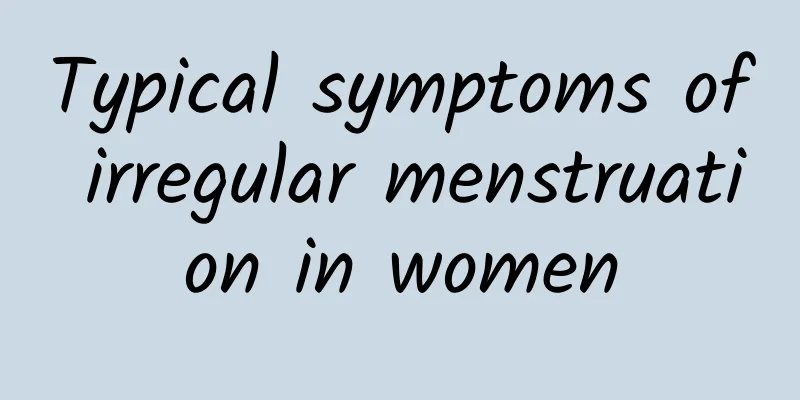What is the reason for thin people to get uterine fibroids? If people become thinner, will uterine fibroids also become smaller?

|
What is the reason why thin people get uterine fibroids? Will uterine fibroids get smaller if people lose weight? Uterine fibroids are one of the most common tumors in the female reproductive system, and they mostly occur in women of childbearing age between 35 and 55 years old. Generally, obesity is considered one of the main causes of uterine fibroids, while the reasons why thin people get uterine fibroids are relatively less concerned. So, what is the reason why thin people get uterine fibroids? Will uterine fibroids get smaller when people lose weight? The following will introduce these issues in detail. To understand why thin people get uterine fibroids, we need to understand the formation mechanism of uterine fibroids. Uterine fibroids are tumors formed by the proliferation of endometrial and myometrial tissues, and the main cause is related to abnormally high estrogen levels. The main reason why thin people get uterine fibroids may be related to genetic factors and endocrine disorders, but the specific reasons still need further research to clarify. Symptoms of uterine fibroids in thin people are similar to those in other patients, including irregular menstruation, prolonged menstruation, excessive menstrual flow, abdominal pain, etc. Therefore, if you find the above symptoms, whether you are thin or not, you need to seek medical attention in time and undergo relevant examinations to confirm the diagnosis. So, if a person loses weight, will uterine fibroids also become smaller? This question is not simple. Generally speaking, weight and body composition will have a certain impact on the growth of uterine fibroids. In obese people, adipose tissue releases estrogen, which nourishes and enlarges uterine fibroids. Therefore, weight loss can alleviate the symptoms of uterine fibroids in obese patients and help control their growth. However, for thin people, weight loss does not necessarily directly lead to the shrinkage of uterine fibroids. Because the growth of uterine fibroids is affected by many factors, and weight loss alone may not fundamentally change the estrogen level in thin patients. Here, we have to introduce the role and production mechanism of estrogen. Estrogen is a female hormone secreted by the ovaries, and they play an important role in women's physiological and reproductive processes. However, our body also produces a small amount of estrogen, including estradiol and estriol, which are mainly produced by the decomposition of fat cells. Therefore, for thin people, losing weight may reduce the number of fat cells in the body, thereby reducing the production of estrogen and the amount flowing into the blood. Although there is no direct research to prove that weight loss can directly lead to the reduction of uterine fibroids, some studies have found that weight loss may alleviate the symptoms of uterine fibroids. In summary, the reason why thin people get uterine fibroids is due to factors such as genetics and endocrine disorders. The specific reasons need further research to determine. Losing weight for thin people does not directly lead to the reduction of uterine fibroids, but losing weight can alleviate the symptoms of obese patients and help control the growth of uterine fibroids. Uterine fibroids are benign tumors that usually do not cause cancer. However, in the case of thin people with uterine fibroids, losing weight is not the best way to shrink the fibroids. If you find any symptoms related to uterine fibroids, please see a doctor in time and discuss with your doctor the treatment plan that is most suitable for you. If medication or surgical removal is required, the doctor will develop a reasonable treatment plan based on your specific situation. At the same time, regular check-ups are important measures to prevent and control uterine fibroids. Early detection and treatment can effectively reduce the adverse effects on life and fertility. |
<<: What is malignant uterine fibroids? What are the symptoms of malignant uterine fibroids?
Recommend
What should I do if bleeding suddenly appears a few days after an abortion?
What should I do if bleeding suddenly appears a f...
What are the symptoms of habitual miscarriage? Pay attention to these two groups of people who are prone to habitual miscarriage
Although the incidence of habitual miscarriage is...
Don’t stop exercising just because you’re tired! To protect your health, you must live and move throughout your life
Some people deliberately avoid using escalators o...
The magic weapon for lowering blood lipids, "okra water", is very popular! 3 easy steps to DIY, effectively relieve diabetes and joint pain
Drinking a cup of "okra water" every da...
Butchers evade investigation! New Taipei City investigates and sends first case to the government
The New Taipei City Government's Health Burea...
How does adnexitis develop?
How does adnexitis develop? First: Generally, it ...
Gynecologist explains the causes of hyperprolactinemia
High prolactin is a common problem for female fri...
What causes habitual miscarriage? You should know these influencing factors
The causes of habitual miscarriage in women inclu...
Is the pain an injury or fatigue? Cumulative injuries
I don't know when it started, but the term &q...
What diseases are easily confused with pelvic inflammatory disease
Pelvic inflammatory disease patients have a group...
What Chinese medicine should I take for a 6 cm uterine fibroid? Is a 6 cm uterine fibroid serious?
What Chinese medicine should I take for uterine f...
Symptoms of vulvar leukoplakia in women
What is vulvar leukoplakia? In fact, vulvar leuko...
What are the causes of infertility caused by chronic pelvic inflammatory disease?
Chronic pelvic inflammatory disease is a very com...
What are the causes of vulvar leukoplakia?
What are the causes of vulvar leukoplakia? I beli...
Nursing for moderate cervical hypertrophy and erosion
The care of cervical hypertrophy and moderate ero...









